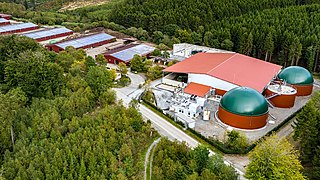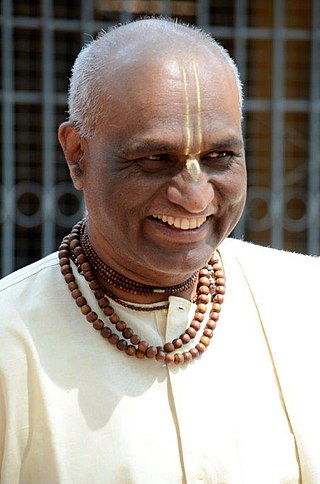
Biogas is a gaseous renewable energy source produced from raw materials such as agricultural waste, manure, municipal waste, plant material, sewage, green waste, wastewater, and food waste. Biogas is produced by anaerobic digestion with anaerobic organisms or methanogens inside an anaerobic digester, biodigester or a bioreactor. The gas composition is primarily methane and carbon dioxide and may have small amounts of hydrogen sulfide, moisture and siloxanes. The methane can be combusted or oxidized with oxygen. This energy release allows biogas to be used as a fuel; it can be used in fuel cells and for heating purpose, such as in cooking. It can also be used in a gas engine to convert the energy in the gas into electricity and heat.

The Mid Day Meal Scheme is a school meal programme in India designed to better the nutritional status of school-age children nationwide. The scheme has been renamed as PM-POSHAN Scheme. The programme supplies free lunches on working days for children in government primary and upper primary schools, government aided Anganwadis, Madarsa and Maqtabs. Serving 120 million children in over 1.27 million schools and Education Guarantee Scheme centres, the Midday Meal Scheme is the largest of its kind in the world.
The Bangalore Agenda Task Force (BATF) in South India was a public-private partnership (PPP) that ran from 1999 till 2004 at the direction of the Chief Minister of Karnataka. The purpose of the taskforce was to bring in business and civic leaders on a pro-bono basis to design a development agenda for the city and suggest ways in which the city's infrastructure and service delivery might be upgraded and improved according to best practice systems elsewhere. The purpose of the taskforce was to build government capacity through partnership between citizens, corporates and the city's main administrative agencies – the BMP, BDA, BMTC, BWSSB, BESCOM, BSNL, and Bangalore Police. The BATF was a particularly influential task force, transcending an 'advisory role' to mobilise private resources and catalyze significant changes in the agencies with which it engaged.

Anaerobic digestion is a sequence of processes by which microorganisms break down biodegradable material in the absence of oxygen. The process is used for industrial or domestic purposes to manage waste or to produce fuels. Much of the fermentation used industrially to produce food and drink products, as well as home fermentation, uses anaerobic digestion.

A garbage disposal unit (also known as a waste disposal unit, food waste disposer (FWD), in-sink macerator, garbage disposer, or garburator) is a device, usually electrically powered, installed under a kitchen sink between the sink's drain and the trap. The device shreds food waste into pieces small enough—generally less than 2 mm (0.079 in) in diameter—to pass through plumbing.

Food Yoga International, formally Food For Life Global, is a non-profit vegan food relief organization founded in 1995 to serve as the headquarters for Food Yoga International projects. Food Yoga International has its roots in ISKCON dating back to 1974. It is a completely independent non-profit organization that supports the work of Food Yoga International projects both inside and outside of ISKCON. Its network of 291 affiliates span the globe, with projects occupying over 65 countries. Volunteers provide over 1 million free meals daily. Food Yoga International engages in various sorts of hunger relief, including outreach to the homeless, provision for disadvantaged children throughout India, and provision for victims of natural disasters around the world.
Renewable natural gas (RNG), also known as biomethane, is a renewable fuel and biogas which has been upgraded to a quality similar to fossil natural gas and has a methane concentration of 90% or greater. By removing CO2 and other impurities from biogas, and increasing the concentration of methane to a level similar to fossil natural gas, it becomes possible to distribute RNG via existing gas pipeline infrastructure. RNG can be used in existing appliances, including vehicles with natural gas burning engines (natural gas vehicles).

Karnataka is one of the highest economic growth states in India with an expected GSDP growth of 9.5% in the 2021–22 fiscal year. The total expected GSDP of Karnataka in 2022–2023 is about $240 billion. Karnataka recorded the highest growth rates in terms of GDP and per capita GDP in the last decade compared to other states. In 2008–09, the tertiary sector contributed the most to GSDP, followed by the secondary sector, and the primary sector.
Despite India's 50% increase in GDP since 2013, more than one third of the world's malnourished children live in India. Among these, half of the children under three years old are underweight.

Sri Radha Krishna-Chandra Temple is one of the largest Krishna-Hindu temples in the world. It is situated in Bangalore in the Indian state of Karnataka. The temple is dedicated to Hindu deities Radha Krishna and propagates monotheism as mentioned in Chandogya Upanishad.

Harvest Power, Inc. was a privately held organics management company headquartered in Waltham, Massachusetts, United States that specializes in converting food waste and yard waste into biofuel, compost, mulch and fertilizer. In 2014 Fast Company named it one of the most innovative companies in the world. In August of 2020 Harvest Power Orlando ceased operations for unknown reasons and all assets were put up for sale; the company was dissolved in April 2021.

Sharad P Kale is a scientist known for developing a biogas plant based on biodegradable waste resource (Nisargruna). He is the head of Technology Transfer and Collaboration at Bhabha Atomic Research Centre (BARC). On 26 January 2013, the Government of India honoured him with the Padma Shri Award in the Discipline of Science and Engineering.

Food waste recycling is a process to convert food waste into useful materials and products for achieving sustainability of the environment. Food waste is defined as all parts of food, inedible and edible, created before, during, and after food processing, production, and consumption. Greenhouse gases, especially methane can be reduced by food waste recycling. Food waste recycling can also alleviate the saturation of landfill sites in Hong Kong.

Madhu Pandit Dasa is a spiritual leader, the President of ISKCON Bangalore. As a humanitarian, he has been actively involved in programs like Akshaya Patra that provides mid-day meals to children studying in Government schools. He is the Founder and Chairman of The Akshaya Patra Foundation, guiding the organisation to realise the vision - "No child in India shall be deprived of education because of hunger”. The Government of India has conferred upon him the prestigious Padma Shri Award in recognition of the distinguished service rendered by Akshaya Patra Foundation for the children of India. He is also the Chairman of Vrindavan Chandrodaya Mandir, the upcoming iconic cultural and heritage complex in Vrindavan.
HomeBiogas is a biogas company based in Beit Yanai, Israel. The company produces and sells anaerobic digesters that convert organic waste into methane gas and liquid fertilizer.

Tejaswini Ananth Kumar is an Indian politician and social worker.

Hare Krishna Golden Temple is located at Banjara Hills, Hyderabad, India. It is the first Golden Temple to be constructed in Telangana. It was inaugurated in 2018 by Vice President of India Sri Venkaiah Naidu.

Stoka Krishna Swami has been serving the mission of Srila Prabhupada as a full-time missionary with ISKCON Bangalore since 1989. He served as the president of ISKCON Mysore.

Divya Sathyaraj is an Indian nutritionist. She is the daughter of actor Sathyaraj and sister of Sibi. Divya is the goodwill ambassador of The Akshaya Patra Foundation (TAPF), an NGO implementing the Government of India’s Midday Meal Scheme for school children. She has also started a movement in 2020, Mahilmadhi Iyakkam, an initiative to provide healthy and nutritious meals to the malnourished and under-privileged communities, free of cost.

Adamya Chetana is a non-profit organisation based in Bangalore, India. The foundation has engaged in various projects in education and social sectors in the key areas of food, literature, health, nature, and culture. It was founded in 1997 by Indian politician Ananth Kumar in memory of his mother Girija Shastri. The organization focuses on various social welfare activities. Tejaswini Ananth Kumar has been serving as the Executive Trustee since the day of inception.
















